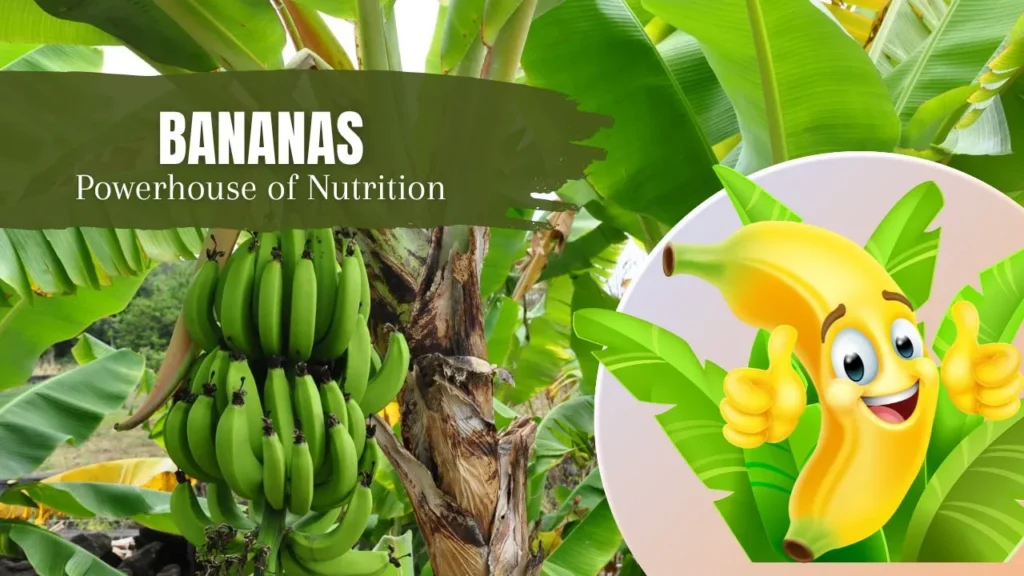Table of Contents
ToggleDiscover the Varieties of Bananas, Their Nutritional Value, and Why They Should Be a Staple in Your Diet
Learn about the different types of bananas, their importance in your diet, and the numerous health benefits they offer. From boosting energy to improving digestion, find out why bananas are a must-have fruit.
Introduction
The Humble Banana—A Superfood in Disguise
Bananas are one of the most widely consumed fruits globally, and for good reason. This tropical fruit is not only delicious but also packed with nutrients that offer a range of health benefits. From the classic yellow Cavendish to the smaller, sweeter Lady Finger, bananas come in various types, each with its unique taste, texture, and nutritional profile. In this article, we’ll delve into the different types of bananas, explore their importance in a balanced diet, and highlight the numerous health benefits that make bananas a true superfood.

Types of Bananas: A Diverse Fruit Family
Cavendish Banana
The Cavendish banana is the most common type you’ll find in supermarkets. It’s the iconic yellow banana that most people are familiar with. This variety is sweet and slightly firm when ripe, making it perfect for eating raw or adding to smoothies and desserts. It’s also rich in potassium, vitamin C, and dietary fiber.
Plantain Banana
Plantains are a starchy variety of banana that is typically cooked before consumption. Unlike the Cavendish, plantains are less sweet and more similar to potatoes in texture. They are often fried, boiled, or baked and are a staple in many tropical cuisines. Plantains are high in carbohydrates, making them an excellent energy source.
Lady Finger Banana
Lady Finger banana, also known as “Baby Banana,” are smaller and sweeter than the Cavendish variety. They have a creamy texture and are often enjoyed as a snack or dessert. Despite their small size, Lady Finger banana are packed with nutrients like vitamin B6, vitamin C, and potassium.
Red Banana
Red bananas have a distinctive reddish-purple skin and a sweeter taste compared to the Cavendish. Their flesh is creamier and slightly pinkish. Red bananas are rich in antioxidants, beta carotene, and vitamin C, making them great for boosting immune health.
Blue Java Banana
Also known as the “Ice Cream Banana,” the Blue Java banana has a unique, creamy texture and a flavor reminiscent of vanilla ice cream. This variety is often used in desserts and smoothies. It’s rich in potassium, magnesium, and vitamin B6, offering excellent nutritional benefits.
Burro Banana
The Burro banana is shorter and more rectangular than the Cavendish, with a slightly tangy taste. Its flesh is firmer, making it suitable for both raw consumption and cooking. Burro bananas are a good source of vitamin C, fiber, and potassium.
Manzano Banana
Also known as the “Apple Banana,” the Manzano variety is smaller with a sweeter taste and a hint of apple flavor. These bananas are perfect for snacking and are often used in fruit salads. They are rich in vitamins, including vitamin C and B6, as well as dietary fiber.

The Importance of Bananas in Your Diet
Bananas are not just a convenient snack; they are an essential part of a balanced diet. Here’s why:
Nutrient-Dense Superfood
Bananas are loaded with essential vitamins and minerals such as potassium, vitamin B6, vitamin C, and magnesium. These nutrients are crucial for maintaining overall health, supporting brain function, and regulating blood pressure.
Natural Energy Booster
Due to their high carbohydrate content, banana is an excellent source of quick energy. This makes them a perfect pre-workout snack, helping to fuel your body and enhance performance during physical activities.
Supports Digestive Health
Bananas are rich in dietary fiber, which aids in digestion and helps prevent constipation. The fiber content also promotes a healthy gut by encouraging the growth of beneficial bacteria.
Heart Health and Blood Pressure Regulation
The high potassium content in bananas is vital for heart health. Potassium helps regulate blood pressure by counteracting the effects of sodium, reducing the risk of hypertension and heart disease.
Rich in Antioxidants
Banana contains powerful antioxidants such as dopamine and vitamin C. These compounds help protect your body from oxidative stress, reducing the risk of chronic diseases like cancer and heart disease.
Weight Management
Despite being sweet, bananas are relatively low in calories and fat. The fiber content also helps you feel full longer, making bananas a great option for those looking to manage their weight.
Supports Mental Health
Bananas are a good source of tryptophan, an amino acid that your body converts into serotonin, a neurotransmitter that helps regulate mood. Consuming banana can help alleviate symptoms of depression and anxiety.
Health Benefits of Banana: More Than Just a Tasty Treat
Improves Skin Health
The vitamins and antioxidants in banana contribute to healthier skin. Vitamin C, in particular, aids in collagen production, helping to keep your skin firm and youthful. Additionally, the antioxidants protect the skin from damage caused by free radicals.
Enhances Athletic Performance
Bananas are often dubbed the “athlete’s fruit” because they provide a quick source of energy and essential nutrients needed during physical exertion. The natural sugars in bananas, combined with their potassium content, help replenish glycogen stores and prevent muscle cramps.
Promotes Bone Health
While bananas are not rich in calcium, they do contain several compounds that support bone health. The potassium in bananas helps reduce calcium loss in the urine, preserving bone strength and density.
Supports Eye Health
Bananas contain small amounts of vitamin A, which is essential for maintaining normal vision. This vitamin, along with the antioxidants present in banana, helps protect the eyes from age-related macular degeneration and other vision problems.
Boosts Immune System
The nutrients in banana, including vitamin C and B6, play a crucial role in maintaining a strong immune system. Regular consumption of banana can help your body fend off infections and illnesses.
Other Perspectives: Environmental and Economic Impact
Bananas are not just important for personal health; they also have a significant environmental and economic impact. As one of the most traded fruits globally, the banana industry supports the livelihoods of millions of people, particularly in tropical regions. However, the large-scale cultivation of bananas has also led to environmental concerns, including deforestation and pesticide use. Supporting sustainable and organic banana farming practices can help mitigate these issues while ensuring that you continue to enjoy this nutritious fruit.
Conclusion
Banana—A Nutritional Powerhouse Worth Celebrating
Bananas are more than just a convenient snack; they are a powerhouse of nutrition that offers a multitude of health benefits. From boosting energy levels to supporting heart and digestive health, banana should be a staple in any diet. With a variety of types to choose from, you can enjoy this versatile fruit in many different ways. Whether you’re adding a Cavendish banana to your morning smoothie or cooking with plantains, you’re making a healthy choice that your body will thank you for.